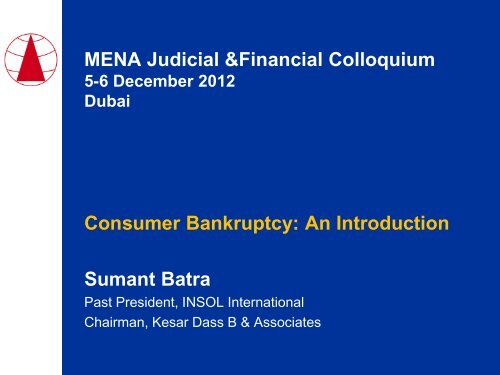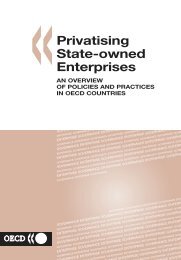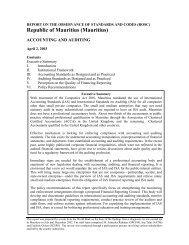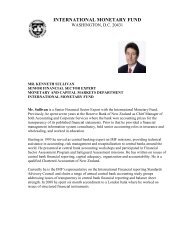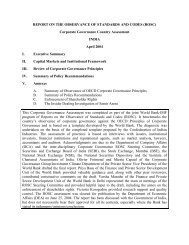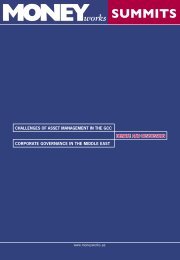Download PDF (92 KB)
Download PDF (92 KB)
Download PDF (92 KB)
Create successful ePaper yourself
Turn your PDF publications into a flip-book with our unique Google optimized e-Paper software.
MENA Judicial &Financial Colloquium<br />
5-6 December 2012<br />
Dubai<br />
Consumer Bankruptcy: An Introduction<br />
Sumant Batra<br />
Past President, INSOL International<br />
Chairman, Kesar Dass B & Associates
Consumer debt<br />
The consumer indebtedness is a great dynamic factor<br />
in any economy.<br />
Consumer consumption is required for both economic<br />
stability and growth.<br />
Governments encourage consumer consumption by<br />
facilitating and expanding consumer credit.<br />
Solving consumer debt problems can be complex.<br />
They are often caused by socio-psychological factors<br />
such as redundancy, divorce, disability, addiction.<br />
These have serious impact on quality of life of debtor.
Consumer debtor<br />
A debtor whose liabilities are incurred primarily for<br />
private, family or household purposes and not as a<br />
result of carrying business, either on own account or in<br />
Partnership or from guarantees.<br />
From the perspective of consumer debtor however,<br />
what matters is their personal liability for debts which<br />
may be caused by private or commercial reasons.<br />
Essentially, it is about natural persons.
INSOL Principles that underlie<br />
resolution of consumer debt problems<br />
Since 1997 INSOL has focussed on the issue of<br />
consumer debt. In 2011 INSOL published a Consumer<br />
Debt Report –II which seeks to obtain global<br />
information on jurisdictions’ laws and practices and to<br />
seek to derive general principles underlying<br />
approaches to the issues across the world.<br />
The report covers 18 countries.
1. Fair and equitable allocation of consumer credit<br />
risks<br />
Society should accept that a consumer debtor may be<br />
unable to pay debts for reasons beyond control.<br />
Law should provide for a fair and equitable, efficient<br />
and cost-effective, accessible and transparent<br />
settlement and discharge.<br />
Creditors should be prohibited from pursuing the<br />
debtors during insolvency proceedings.<br />
Insolvency estate should be determined. Debtor should<br />
be able to make a living.
Separate proceedings for debtors who have no<br />
redemption capacity and those with accommodation<br />
debts.<br />
Cross-border recognition is important.<br />
2. Discharge of indebtedness, rehabilitation or a<br />
“fresh start”.<br />
Debtor should have an opportunity to have a discharge<br />
from pre-existing liabilities and make a “fresh start” free<br />
from past financial obligations.<br />
Ideally there should be no link to future income after<br />
termination of proceedings.<br />
Discharge should cover as many debts as possible.
Separate proceedings for debtors who have no<br />
redemption capacity and those with accommodation<br />
debts.<br />
Cross-border recognition is important.<br />
2. Discharge of indebtedness, rehabilitation or a<br />
“fresh start”.<br />
Debtor should have an opportunity to have a discharge<br />
from pre-existing liabilities and make a “fresh start” free<br />
from past financial obligations.<br />
Ideally there should be no link to future income after<br />
termination of proceedings.<br />
Discharge should cover as many debts as possible.
3. Extra-judicial approach.<br />
Out of court proceedings should be encouraged. They<br />
may operate under the shadow of law. They may be<br />
designed as a pre-requisite to filing formal proceedings.<br />
Creditors should have a fair assurance that its rights<br />
are protected.<br />
Court approvals may be given to make the schemes of<br />
arrangement binding.<br />
Professional independent debt counseling is critical.
4. Prevention<br />
Information and education on risks attached to<br />
consumer credit.<br />
Lenders should observe the way credit is made<br />
available to consumers. A fine balance must be drawn<br />
as tightening standards will reduce consumption.<br />
Organizations of consumer and lenders may be set up<br />
that should set up joint programs to monitor consumer<br />
loan delinquencies.
Thanks!<br />
Sumant.batra@kesardass.org


